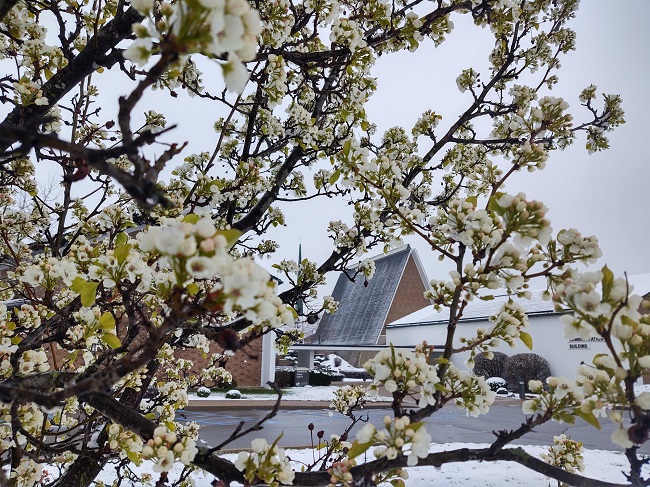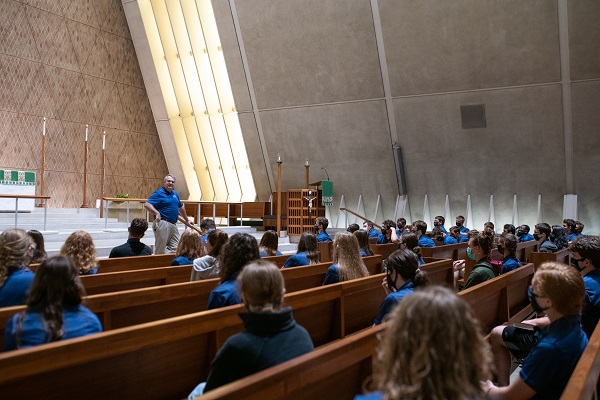
Christ Academy High School Begins


Concordia Theological Seminary, Fort Wayne
κήρυξον τὸν λόγον. Preach the Word.

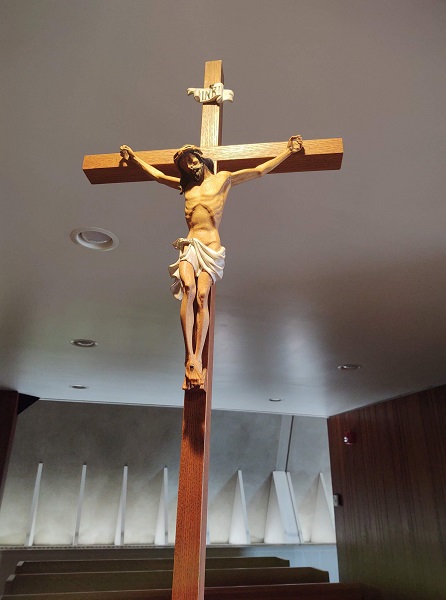 On-campus life continues to open up here at CTSFW, with prudence and caution still playing a major role in all decision-making. All visitors, students, staff, and faculty are required to wear face masks, with exceptions for those teaching a class who need to be heard clearly (so that no one has to try and understand Greek through a mask). Physical distance remains the expected norm and the absentee policy also remains flexible, to allow students, faculty, and staff to make prudent decisions about their health, especially if they are showing any symptoms.
On-campus life continues to open up here at CTSFW, with prudence and caution still playing a major role in all decision-making. All visitors, students, staff, and faculty are required to wear face masks, with exceptions for those teaching a class who need to be heard clearly (so that no one has to try and understand Greek through a mask). Physical distance remains the expected norm and the absentee policy also remains flexible, to allow students, faculty, and staff to make prudent decisions about their health, especially if they are showing any symptoms.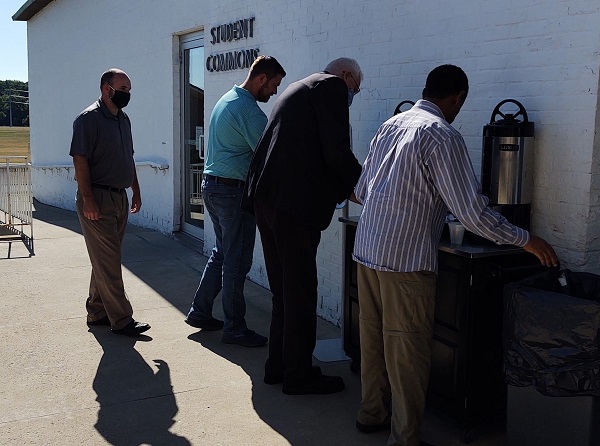
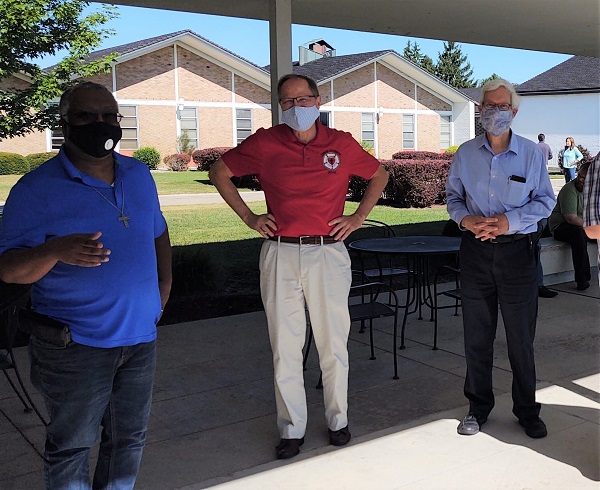
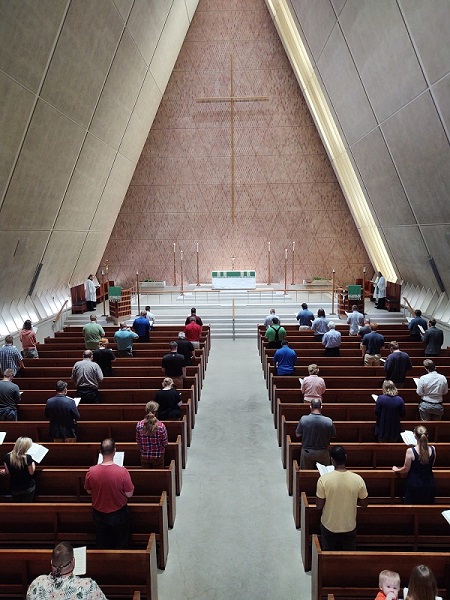
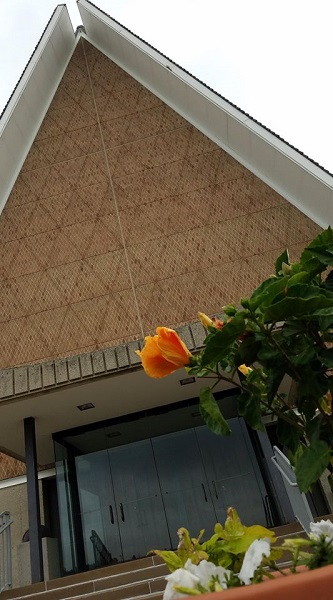 As the summer sessions begin and we look forward to welcoming the next class of seminarians on campus with the beginning of Summer Greek on Monday, June 15, the question has come up: how are we, as a Seminary, handling the re-introduction of normal even as we remain cautious?
As the summer sessions begin and we look forward to welcoming the next class of seminarians on campus with the beginning of Summer Greek on Monday, June 15, the question has come up: how are we, as a Seminary, handling the re-introduction of normal even as we remain cautious?
CTSFW President Dr. Rast wrote a letter to the incoming students, which I’ll share in part. But first, here are some of the essentials of the guidelines for the summer:
We’ll begin to open campus in June for residential courses, with guidelines in place, such as using larger classrooms, requiring masks during classes, with most assignments distributed electronically. Our absentee policy will also be more flexible as we are asking all to be very cautious about attending class if they have any question about their health. Summer courses will be recorded so that they are still available electronically.
For now, chapel attendance is still closed and only available via livestreaming, but that will soon change. Beginning with Summer Session II on June 15, chapel will be open to students, faculty, instructors, and staff only; student families and visitors will need to wait longer for in-person attendance. Come June 15, you’ll see the additional protections in place on the livestream: physical distance and face coverings. Those leading worship, preaching, and teaching will not be required to wear masks (so that we can hear them), so we will rely on physical distance as a precaution. Weekly Holy Communion will resume in September.
For now the library will remain physically closed to visitors, with services continuing the way they have during Spring Quarter. Students can request books for pick up, scans of articles and book chapters not accessible online, and the Revs. Smith and Peters in the library are available by Google Hangout appointment for research assistance. The bookstore is slowly opening with regular hours resuming on June 15, though guidelines include masks, a limit of four customers, with time limited to 10 minutes.
The Clothing Co-op has had to take a break from accepting donations because of the overwhelming love and support we have received during this time. Director of the Co-op, Deaconess Katherine Rittner, let us know that she has been so inundated from the generosity that she and her staff need time to sort and organize. They intend to reopen on Monday, June 15, accepting donations on Monday, Tuesday, Thursday, and Friday from 9 a.m. to 3 p.m.
These are the guidelines for now; we’ll change as needed with the circumstances and restrictions on the state and federal levels. The plan is to update our guidelines for the latter half of the summer, prior to the start of Summer Session III in mid-July.
From Dr. Rast:
By resuming in-person classes in a few weeks, we are attempting something that very few other institutions of higher education in this country have yet considered. Because we highly value residential learning, we believe that it is time. But we must be cautious so that our return to normalcy is not disrupted…
Of course, our best laid plans may not prevent some in the seminary community from getting the virus. As the guidelines Dr. Gieschen sent you indicated, if you exhibit symptoms, stay home and keep us informed. We want you and the entire seminary community to be safe. Remembering the bigger picture, we all know that for the Christian this virus is ultimately nothing to be feared. But as the seminary attempts to navigate the difficult challenges ahead, including significant financial ones, we must be prudent in our actions so that we don’t unnecessarily open ourselves to a severe outbreak. Doing so would not make us good stewards of the seminary and of all that has been entrusted to us by our faithful supporters and our Lord. With nearly two-thirds of our faculty as well as a good number of staff over the age of 60—and some having serious underlying health issues—we must also consider how best to protect them so that they can continue serve as well…
Believe me when I say that the seminary administration had no idea what was about to hit us as we prepared to return from spring break less than three months ago. Events have moved so quickly that we, like just about everyone else, have struggled to keep up. Yet, by the grace of God, we will come through this with our mission intact, namely, to send you out into a world that needs to hear the good news of life in Christ. We accomplished that mission this past spring by keeping instruction going so that a new crop of pastors, vicars, and interns could be sent out. Now it’s your turn, as well as those who are just beginning the journey.
In his famous treatise, The Freedom of the Christian, Martin Luther posed two seemingly contradictory theses: “A Christian is a perfectly free lord, subject to none; a Christian is a perfectly dutiful servant, subject to all.” This is our opportunity to live out Luther’s insight as we carry on in the freedom of the Gospel all the while loving our neighbor.
With Dr. Rast, we thank you all for your understanding. Let us know if you have any questions and we’ll answer as we can in the comments. God’s richest blessings to you all. We daily look forward with joy to your comments and questions in the chapel livestream every weekday morning at 9:35 Eastern Time.
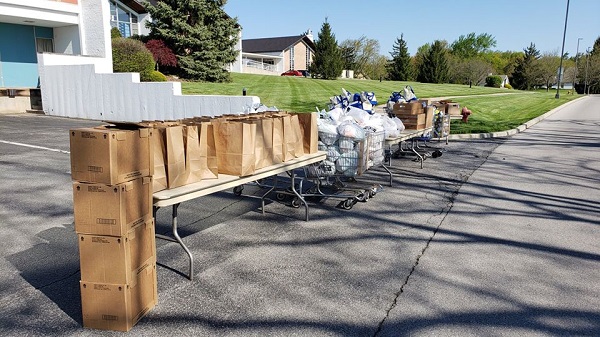
The Food Co-op at CTSFW continues to serve the students even in the midst of restrictions and regulated physical distance. On Tuesday of last week, they held another food drive-thru service, loading up the back of each car as they drove up to the back door of the Co-op and waited their turn. From Deaconess Katherine Rittner, Director of the Food & Clothing Co-op:
“Yes, we are still feeding our students and their families during this time, all-be-it a little differently. The staff of the Food Co-op put together insulated bags with meats in there as well as providing milk, fresh fruits and produce. Eggs are a little harder to come by, but we are able to get them thanks to our amazing donors who are buying them or donating fresh farm eggs. In addition we are putting together boxes with canned goods and staples for the pantry (pasta, instant potatoes, canned fruits, peanut butter and jelly, etc.)
“We have the most amazing donors who are showing us daily the reminder Jesus gives us in Matthew 6:25-34: ‘Therefore I tell you, do not be anxious about your life, what you will eat or what you will drink, nor about your body, what you will put on. Is not life more than food, and the body more than clothing? Look at the birds of the air: they neither sow nor reap nor gather into barns, and yet your heavenly Father feeds them. Are you not of more value than they? And which of you by being anxious can add a single hour to his span of life? And why are you anxious about clothing? Consider the lilies of the field, how they grow: they neither toil nor spin, yet I tell you, even Solomon in all his glory was not arrayed like one of these. But if God so clothes the grass of the field, which today is alive and tomorrow is thrown into the oven, will he not much more clothe you, O you of little faith? Therefore do not be anxious, saying, “What shall we eat?” or “What shall we drink?” or “What shall we wear?” For the Gentiles seek after all these things, and your heavenly Father knows that you need them all. But seek first the kingdom of God and his righteousness, and all these things will be added to you.’
“‘Therefore do not be anxious about tomorrow, for tomorrow will be anxious for itself. Sufficient for the day is its own trouble.'”
She continued:
“We truly are blessed and because of our donors, we are able to continue feeding our students during these difficult times. Some of them are placing orders to be picked up at the local Wal-mart or Kroger and Deaconess Rittner stops to pick them up on her way to the campus. This allows us to easily restock the shelves for easy packing of the food.
In addition, we are finding new avenues to obtain much needed food items for the shelves with the generous donations that are still coming in for the support of the students. I am reminded daily of God’s love and mercy because of the amazing donors we have and I pray daily for each and every one of them. They are truly the visible reminder of God’s caring and love.”
If you are in the area and interested in dropping off items at the Clothing Co-op, the staff are working towards transitioning from appointment donation drop-offs to open drop-off times with more flexibility. Currently, all available appointment times are filled for the week of May 18-29. However, from June 1-12, curbside donations will be accepted between 9 a.m. and 12 p.m. Donors are not permitted inside, but can place items in the bins; receipts are available in a plastic bag on the end of the bin. The plan is to return to normal on June 15, the week that Summer Greek starts.
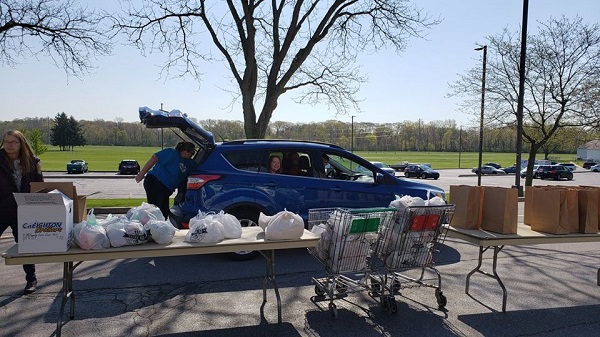
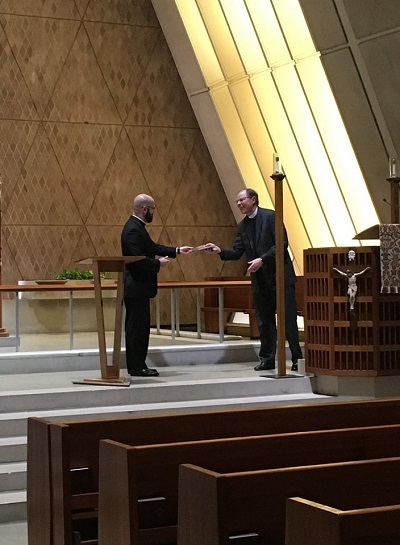 Today after chapel, Dr. Charles Gieschen, Academic Dean, presented the annual academic awards at CTSFW. You can still watch the presentation at the end of today’s daily chapel service either here on Facebook or at www.ctsfw.edu/dailychapel. Fourth-year seminarian and Student Association President Jonah Domenichelli served as master of ceremonies. At the end of the service, fourth-year seminarian Mark Kranz presented the 2020 Class Gift: “Apostolic Agenda: The Epistles of the Holy Apostle Paul to Titus and Philemon.” The translation of this work by Friedrich Balduin was commissioned and funded by this year’s fourth years. You can find a copy at https://emmanuelpress.us/2020/05/05/coming-soon-apostolic-agenda-the-epistles-of-the-holy-apostle-paul-to-titus-and-philemon.
Today after chapel, Dr. Charles Gieschen, Academic Dean, presented the annual academic awards at CTSFW. You can still watch the presentation at the end of today’s daily chapel service either here on Facebook or at www.ctsfw.edu/dailychapel. Fourth-year seminarian and Student Association President Jonah Domenichelli served as master of ceremonies. At the end of the service, fourth-year seminarian Mark Kranz presented the 2020 Class Gift: “Apostolic Agenda: The Epistles of the Holy Apostle Paul to Titus and Philemon.” The translation of this work by Friedrich Balduin was commissioned and funded by this year’s fourth years. You can find a copy at https://emmanuelpress.us/2020/05/05/coming-soon-apostolic-agenda-the-epistles-of-the-holy-apostle-paul-to-titus-and-philemon.
ACADEMIC AWARDS
The St. Timothy Award: Silas Hasselbrook
The Zondervan Greek Award: Gino Marchetti II
The Zondervan Hebrew Award: Zachary Oedewaldt
The Exegetical Theology Writing Award: Blake Martzowska
The Classical Association of the Middle West and South Award for Outstanding Accomplishment: Alexander Blanken
The Draves Family Scholarship: Joshua Schiff
The Zondervan Theology Award: Christian Schultz
The Systematic Theology Writing Award: Gino Marchetti II
The Gerhard Aho Homiletics Award: Kyle Nelson
The Pastoral Ministry and Missions Writing Award: Daniel Gray
The Historical Theology Writing Award: Jonathan Olson
OTHER AWARDS
The Elizabeth Fedde Award for Outstanding Service (presented by Dr. James Bushur): Anna Barger and Kimberly Wolkenhauer
The Shepherd’s Staff Award (presented by Seminarian Jonah Domenichelli): Brett Witmer
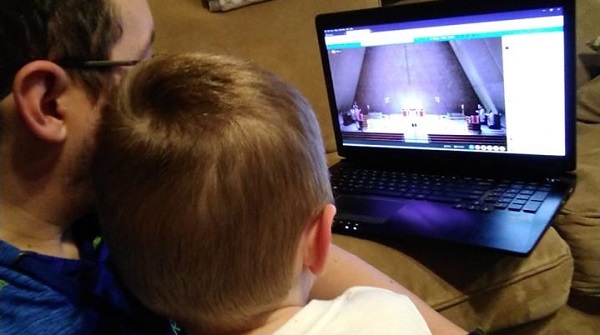
Now faith is the assurance of the things hoped, the conviction of things not seen.
Hebrews 11:1
On March 12, President Rast chose, with the input of the Seminary’s leadership team, to move to online delivery of education for the beginning of the spring quarter. “As the weeks are turning into months, I can tell you that I have never made a more difficult or disappointing decision,” said the Rev. Dr. Lawrence R. Rast Jr. on April 30, in his sermon at the combined 2020 Vicarage and Deaconess Intern and Placement and 2020 Call Service at Concordia Theological Seminary, Fort Wayne (CTSFW). “Our congregations have, in many cases, not been able to meet, or have done so under the most difficult circumstances. We grow impatient to be together, and understandably so, for it is toward evening and the day is almost over.”
And yet he also could, and with joy, open the service with this familiar greeting: “Alleluia! Christ is risen. He is risen indeed, Alleluia.”
The story of the Seminary’s perhaps most unique Call Night—the pews empty, the entire congregation, save for five faculty members conducting the service in Kramer Chapel, online—is one that can be told best in their own words. “Things have changed dramatically over the past several weeks for all of us—that is certainly evident in the empty pews that are in this chapel,” Dr. Rast continued in his opening greeting. “Yet even now, as we prepare to send out new vicars, deaconess interns and candidates, and pastors, much is the same.”
Thousands in the Church joined the service from the world over, from all 50 states alongside our brothers and sisters in Christ across six continents. This year’s 40 pastoral candidates watched the service on a combined Zoom Meeting, which was shown at times throughout the Vespers service.
In his sermon, Dr. Rast preached on the Emmaus passage from Luke 24:13-35. From verse 21:
“We had hoped.” The finality of the disciples’ words is overwhelming. All they had worked for, hoped for, prepared for over the course of a number of years was now ended, finished. Their hopes were wrecked, their dreams unrealized, their expectations dashed…
Yet as they trudge along, they are joined by an unrecognized companion who engages them in what may be the most ironic conversation recorded in all of the Scriptures. Ironic because we know who He is and what the outcome will be. But our downcast disciples are kept from recognizing their friend…But why? Why could they not recognize him? And the answer is simply this: so Jesus could reveal himself to them in the midst of their human weakness and within the context of their profound challenges, as He always does through the Scriptures and the breaking of the bread…
We [too] had hoped. We—students, families, congregations, staff, faculty—we are the disappointed disciples this evening. This sanctuary was supposed to be full; full of pastoral and deaconess candidates, vicars and interns, their family, friends, all expectantly waiting for news of pastoral calls, deaconess placements, vicarage assignments, deaconess internships. There is no noisier place on this campus than this chapel before Call Service every year. Tonight, it is silent. Yes, there’s a skeleton crew (I use the language intentionally), who sends this service out to a scattered community that is still largely sheltering in place, but it is not what we hoped for.
Our feet drag as we plod through a quarter unlike any in the nearly 175 year history of this school. We trudged into this virtual call service that lacks the fulfillment only a gathered community can provide. Where previously there had been hopeful anticipation, now there is disappointment. “And they stood still, looking sad.” That could be us.
But it cannot be us. Because we have hope. We hope because we know and believe the outcome of Jesus’ story. We know that Christ is risen: he is risen indeed! Alleluia. Tonight is different, no doubt. There has never been a call night, vicarage assignment, deaconess placement and internship service like this. We expected something quite different. We had hoped we could do things the way we had traditionally done them. But no. Still, tonight is no different than those other nights in this most important respect: for 174 years, Christ has called men to pastoral service in his name; he will do so again in mere moments. Christ has formed servants for service in his name and diaconal positions. He continues to do so. Christ continues to form servants through vicarages and internships. This very night the work of Christ continues. He is faithful.
The Rev. Dr. Gary W. Zieroth, Director of Vicarage, announced vicarages for 34 Master of Divinity (MDiv) students and one Alternate Route student. “Dear brothers in Christ,” he began, “As you hear your names called, remember the words from Deuteronomy 31:6: ‘Be strong and courageous. Do not be afraid or terrified because of them, for the Lord your God goes with you. He will never leave you or forsake you.’”
Four deaconess internships were announced, as were two deaconess placements. In his introduction before their distribution, the Rev. Dr. James G. Bushur, Director of Deaconess Studies, explained the role of deaconesses in the Church:
The Gospel of divine mercy does not begin with God speaking, but with His hearing. Mercy begins when He hears the blood of Abel crying out from the dirt; when He hears the desperate pleas of His children in Egyptian bondage; when He hears the groans of Jonah from the belly of the fish. Indeed, dear friends, the joy that is ours this Easter season is found in the intercessory blood of Jesus, which speaks better things than that of Abel. Indeed, it is this blood that even now continues to speak before the father ever moving Him toward mercy.
And so it is for this reason that we count it a great blessing on this campus to participate in the formation of both pastors and deaconesses. If pastors are called to speak, deaconesses are formed to hear, to be—shall we say—the ears of God. The deaconess vocation is about perceiving the need of our neighbor, and in responding to those needs with the salutary fellowship of Christ’s body the Church. And so deaconesses serve so that the cries of the aborted and the abused, the afflicted, the hungry, the lonely, the oppressed, and the sick are heard by the Church, a hearing which then comes before our heavenly Father and invites His mercy. How profound the need for this vocation is in our day.
The Rev. Dr. Jeffrey H. Pulse finished the night’s distributions with the announcement of 40 pastoral calls. “So where does one begin?” he asked. “I spent considerable time, which I seem to have a bit of right now, trying to sort out the beginning of this address. ‘It was the best of times; it was the worst of times.’ Already been done. ‘These are extraordinary times we find ourselves in.’ Already been overdone. ‘Even though we cannot be together, in fact, we are always united in spirit.’ Blah, blah blah…
The most important realities have not changed at all. The Church still needs workers in the harvest field. The congregations still need pastors to carry out Word and Sacrament ministry. The Seminary still needs to get rid of you so we can bring in another class. And because these things do not—have not—changed, I have good news for our Church Body, good news for your Seminary, and really good news for all of you: all 40 students who are ready to be placed are receiving a call this evening…
This year, there are 36 MDiv candidates and four Alternate Route candidates from our Seminary for a total of 40, and 52 MDiv candidates and four Alternate Route candidates from our sister seminary in St. Louis. Combine this with SMP, CHS, CMCEIIT—those students—then we have a total of 103 candidates: 96 MDiv and Alternate Route. There were 129 calls available for us and 100 calls extended, as well as one for a colloquy candidate. That leaves 28 calls available and not used. This is actually a few more than last year, so the need for pastors continues. We would ask for your prayers, of course, for those congregations not receiving a candidate at this time.
As always, the announcements of the pastoral calls ended with the Charge to the Candidates for the Holy Ministry. These 40 men rose from where they were sheltering in place, standing in apartments and houses and churches across the nation. “Go then, take heed unto thyself and to all the flock over which the Holy Ghost hath made thee overseer,” Dr. Rast began the charge, finishing with, “The Lord bless thee from on high, and make thee a blessing unto many, that thou mayest bring forth fruit and that thy fruit may remain unto eternal life. Amen.”
The answering, “Amens!” were scattered by the technological challenges of syncing 40 voices separated by distance, but spoken in the same truth and promise as those in every generation of pastors in the 173 years before them. Thanks be to God!
To re-watch the service, view the map for where these 81 men and women are headed, and to access the pdf lists for the 2020 Vicarage Placements, Deaconess Internships, Pastoral Calls, and Deaconess Placements, go to https://callday.ctsfw.edu.
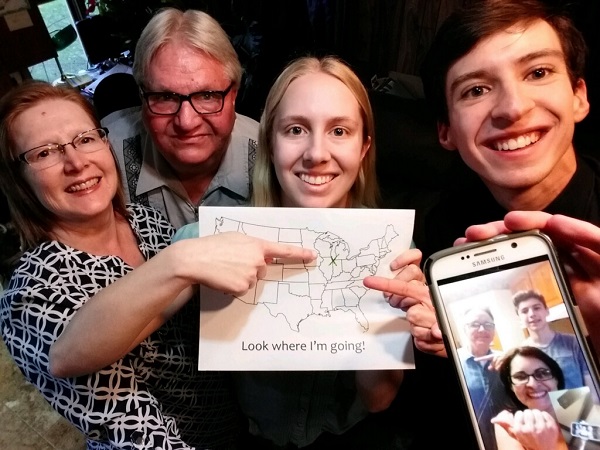
By Jason L. Iwen, Assistant to the Chief Information Officer at CTSFW and Second-Year MDiv Student; he was in Kramer Chapel on Call Night to help with recording directions for the faculty and kantors.
Peter Scaer said that an empty chapel is hard on the eyes. A silent chapel is just as hard on the ears.
If you’ve ever been in Kramer Chapel on call night, you know that it is anything but silent before the service begins. The room is filled with energy as old friends greet one another. Family members discuss the possibility of being placed near a beach or mountains. Professors joke with them that they will instead end up in rural Nebraska or the frozen tundra of North Dakota. Laughter and joy-filled conversation—this is what Kramer Chapel is supposed to sound like before the call service begins. This year, however, was much different. This year, silence is what surrounded the eight of us who were physically in Kramer Chapel for the service. The difference between this night and all previous call nights was striking.
In the chancel: Dr. Grime lights the candles. He does so in silence.
In the pulpit: Dr. Rast stands awaiting my cue to begin his words of introduction and welcome. He stands in silence.
In the aisle near the baptismal font: Dr. Bushur (who is holding the crucifix), Dr. Pulse, and Dr. Zieroth all wait for the appointed time to begin the procession. They stand in silence.
In the choir loft: Kantor Hildebrand sits at the organ console, and Kantor Machemer stands ready for the service to begin. They, too, wait in silence.
Certainly, there are brief conversations as the appointed time approaches. Mostly, though, it is the silence that crowds my memory—because silence is not what should be filling Kramer Chapel on this night.
We finally get a reprieve from the silence. The clock strikes seven, and the service begins with Dr. Rast’s opening remarks, followed by the processional hymn. Those of us in the chapel are able to hear the hymn, even though it isn’t happening live in that space. And the room is filled once again with the glorious sounds of music made by the saints of God. I close my eyes and envision the room full of people, as we all had hoped it would be on this night.
To be sure, many of the other parts of the service do not fill the chapel with the sound we are all accustomed to hearing. But at least it isn’t silent. The Word of God is proclaimed through the reading of Scripture and through Dr. Rast’s wonderful sermon. It is also proclaimed in song, and the music is wonderful to my ears—even when it is not happening live in the chapel. When the hearts of all God’s faithful children from around the entire country – indeed, the entire world – join together with those of us praying in the chapel, those prayers rise as incense before God, and we know that He hears them.
During all of these portions of the service, the silence is gone, and Kramer Chapel sounds a little bit like it should on call night.
When the reading of names and placements commences, however, the silence returns. Each time a name is read, it is followed by silence. I know that the reason for this silence is to allow time for those viewing the service from home to see the person who has just been named, and where they are being sent. Not having that visual, though, I am only able to see the silence. As the announcements continue from vicarages – to deaconess internships – to deaconess placements – to candidate calls, the silence intensifies and becomes almost deafening. It intensifies to the point that I can almost touch it.
There is a part of me that wishes that I had been able to see the video of this service as it was happening. But I know that I was where I needed to be for this event. Making this service a reality took a team of people—each of us in a different role and all of us doing our very best to make it the best that it could possibly be. We had many reasons to set the bar so high. We wanted this to be a special service for all those men and women receiving placements, and for their families. We wanted this to be a special service for the congregations receiving vicars, deaconess interns and deaconesses, and pastors. Above all, we wanted God to be glorified in this service. I believe He blessed those efforts, and I feel truly privileged and blessed to have been a part of it!
I have now seen the video of the service. The visual difference in the full procession of all previous years fading into the minimal 2020 procession is striking. As Dr. Scaer said, an empty chapel is hard on the eyes. Being inside the chapel, the difference in sound was just as striking. A silent Kramer Chapel is hard on the ears.
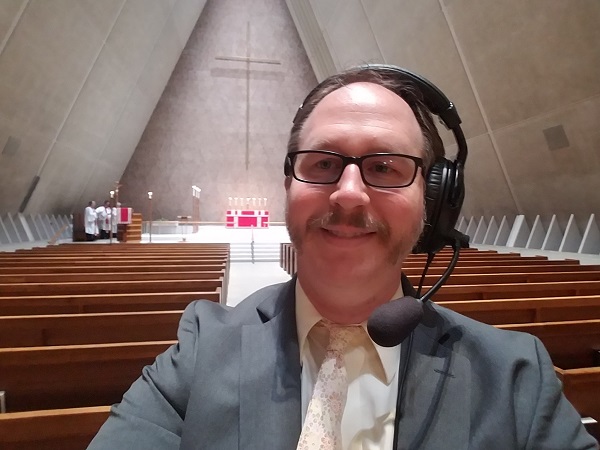
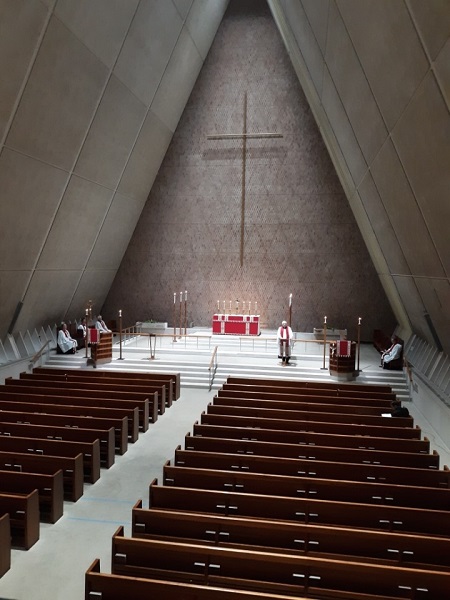
Some reflections from Dr. Peter J. Scaer, Professor and Chairman of Exegetical Theology here at CTSFW, on Call Day and Night (pulled, with permission, from his personal Facebook page):
I can tell you where history ends, and so can the men of Concordia Theological Seminary. Tonight, we celebrate call night, as our men find out the fields in which they will labor and sow the gospel seeds. To be sure, this night is historic, in that the service will be online. The technological revolution in service of a message that turns the world upside down.
These men are being called to preach the one who is Alpha and Omega, beginning and end. They are being sent to proclaim the Lamb, slain before the foundation of the world. They are being called to tell the world that the one whom the prophets foretold did indeed come. This is Emanuel, God in the flesh, who lived for us, and died for us, who rose again from the dead, and who will, soon, very soon return.
Where does history lead? It leads to Christ, the one through whom this universe was created, the one who put the stars in the sky, the fish in the sea, and the animals on the face of the earth. The one who created us in his image, and fulfilled his promise to redeem us, that we might be one with him…
An empty chapel is hard on the eyes.
On the other hand, those present were surrounded by angels and archangels and a great company of emojis, from east and west. Goldilocks would have found the sermon just right. Expressing the disappointment, but true joy, President Rast hit the nail on the head. We had hoped. But hope is alive in Christ…
But the highlight of the night? The presence of students, if even at a distance. Enough to bring tears, so beautiful, so poignant. Man, has our seminary been blessed by their presence. When they sang, it was a little piece of heaven…Tonight the chapel was haunted by the Holy Spirit. The pews were empty, but the Spirit of Christ was present, and we knew it. A little sadness, to be sure, but so much that was so sweet.
You can read both of his full reflections here (which includes some direct thank yous to the specific men who made last night possible):
Before Call Night: https://www.facebook.com/pjscaer/posts/10163495600980252
Following Call Service: https://www.facebook.com/pjscaer/posts/10163499260410252
A couple of weeks ago, we did a Facebook series on some of the behind-the-scenes work still ongoing here at CTSFW. Though we managed to highlight the library, dining hall, Food Co-op, and dorm students, one of the departments we didn’t get to: Information Technology.
The IT team here at the Seminary have kept us going in many seen, yet largely unseen, ways. These men (and one woman) are busy with the following:
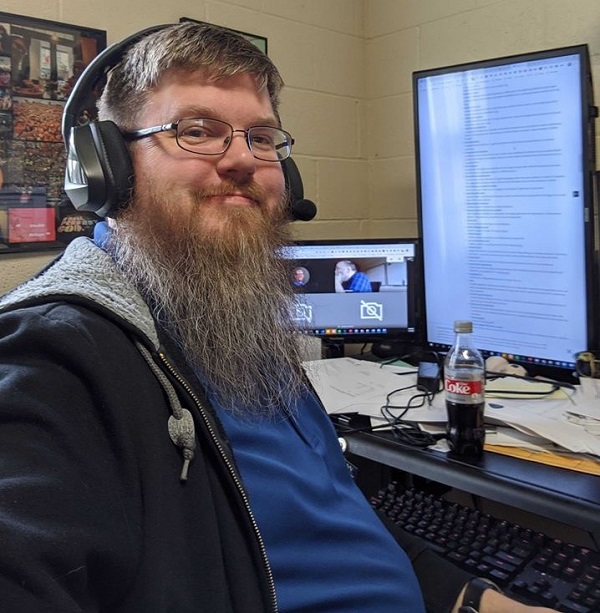 There’s the head of IT, Chief Information Officer Rev. Bill Johnson (whom you saw preaching in chapel this morning), who has lately been doing much of the heavy lifting for the Call Day website (callday.ctsfw.edu), besides many other duties.
There’s the head of IT, Chief Information Officer Rev. Bill Johnson (whom you saw preaching in chapel this morning), who has lately been doing much of the heavy lifting for the Call Day website (callday.ctsfw.edu), besides many other duties.
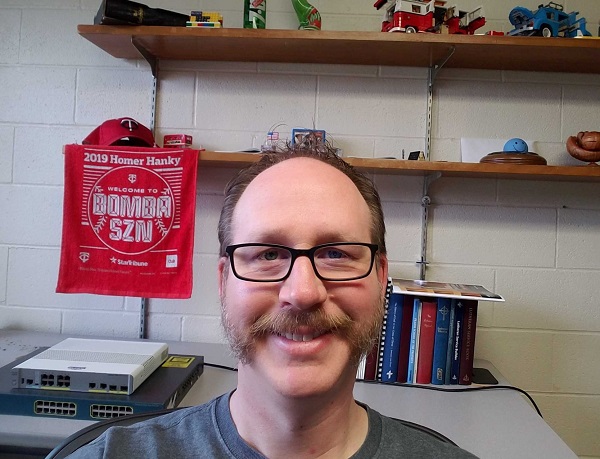
Jason Iwen, MDiv student and “Assistant to the Chief Information Officer” (and I suspect a nod to The Office in the title), is involved in ongoing improvements to the Helpdesk system, our tech problem helpline for all staff, students, and faculty. He’s also been training faculty to use the tech tools that make online classes possible.
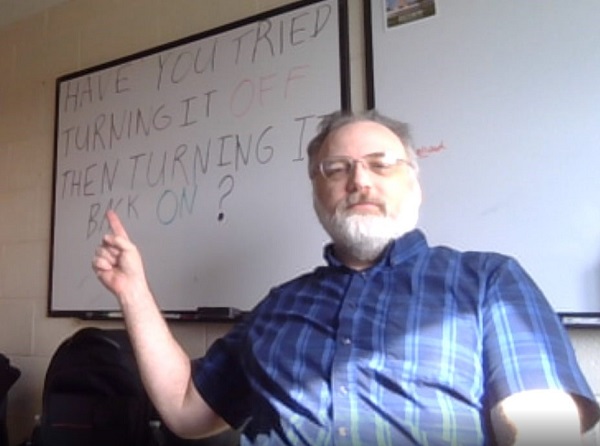
Rich Woodard is helpfully pointing to a bit of tech advice in his picture; he’s not as involved in current quarantine-specific duties, but is mainly focused on prepping data migration for a massive project coming this fall: a new unified campus system.
Lawrence Rast III (not pictured), Network Manager and IT Help Desk, works primarily with Helpdesk response, plus on additional customization of the new campus systems.
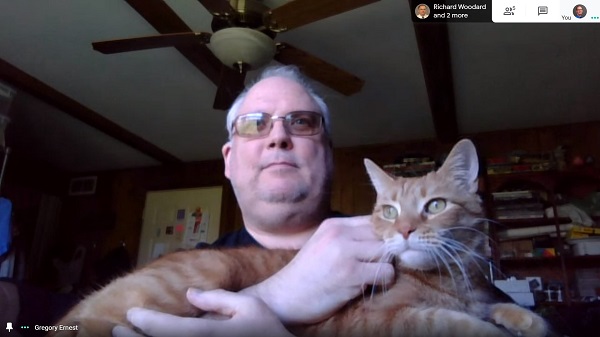 Pictured with his feline coworker, Greg Ernest, Network and Systems Administrator, has lent in a hand with Helpdesk, though he also works on system backup management and development of the relocation module for the new unified system.
Pictured with his feline coworker, Greg Ernest, Network and Systems Administrator, has lent in a hand with Helpdesk, though he also works on system backup management and development of the relocation module for the new unified system.
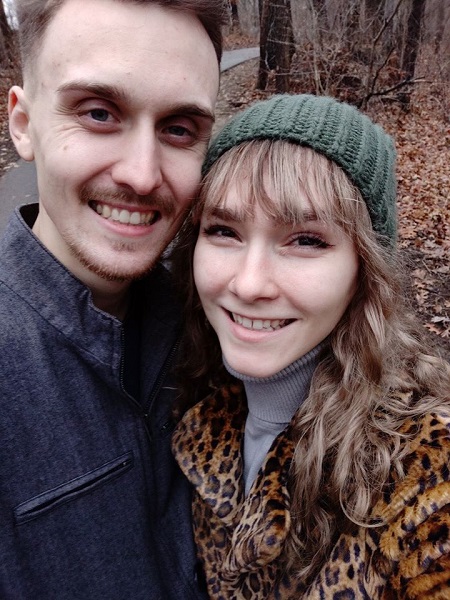 Joanna Sutton, Educational Technologist (and pictured here with her husband), does a lot of the prep work before each academic quarter begins, setting up courses through our classwork system; she’s begun preparing for summer courses as usual.
Joanna Sutton, Educational Technologist (and pictured here with her husband), does a lot of the prep work before each academic quarter begins, setting up courses through our classwork system; she’s begun preparing for summer courses as usual.
Last, but certainly not least (though also, unfortunately, not pictured, as he prefers to be behind the camera rather than in front of it), is someone whose work you know very well: John Elmer, Media Content and Services Manager. Here on Facebook, I more familiarly refer to him as our video guy. He set up and manages the classroom recording system, makes the chapel broadcast happen every morning, and is currently finishing several projects for next Wednesday’s Call Service.
Every year, we also employ a handful of student workers. A couple weeks back, one IT student worker explained, with some exasperation, that when a fellow classmate suggested they send thank yous to one of the departments for their extra work during this time, he recommended they include IT. “Why?” his classmate asked blankly. “They don’t do anything.”
Rev. Johnson, when he heard the story, only laughed. “As IT, you know you’re doing your work well when no one notices it.”
Thank you all for your work, noticed and unnoticed. You’re integral to making this—the strangest, most unique academic quarter we’ve perhaps ever had—workable. God bless you all and your service to the Seminary and the community here and online!
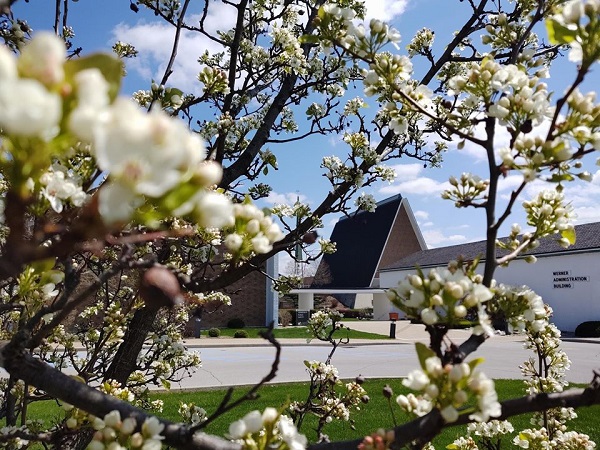
Behold, the Fort Wayne, Indiana, weather report, represented by two photos taken almost exactly 24 hours apart. God’s blessings to you all as we head into the weekend!
